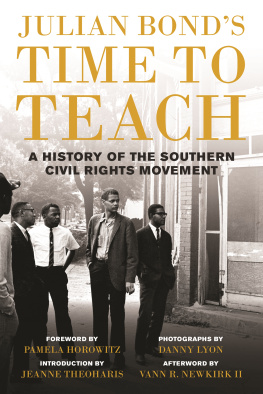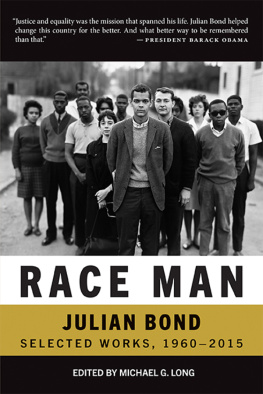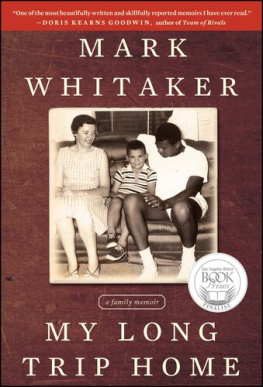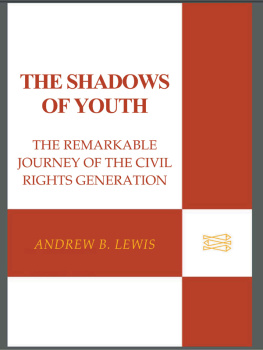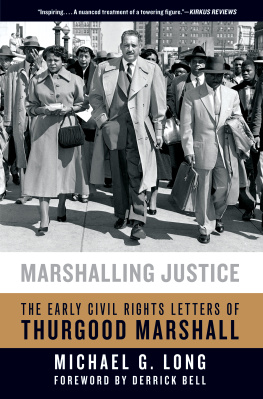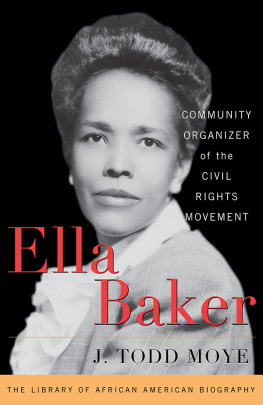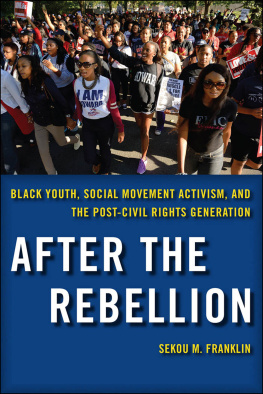Contents
Guide
Pagebreaks of the print version

To Professor Bonds students, past and future
FOREWORD
by Pam Horowitz
F OLLOWING THE UNITE THE RIGHT white supremacist rally in Charlottesville, Virginia, in August 2017, Julians cousin Cynthia Bond, writing in the Village Voice, wondered if the rallys organizers, Richard Spencer and Jason Kessler, both University of Virginia graduates, Spencer in 2001 and Kessler in 2009, had taken Julians course on the history of the civil rights movement, which he taught at their alma mater from 1992 to 2012.
We dont know, but its highly unlikely. We do know that many of the more than five thousand students who did take the course found it transformative. The class and its teacher changed my life is not an atypical comment.
Just as Julians students loved learning it, Julian loved teaching them that they could be agents of social change. For him, that was teachings greatest reward. He liked to tell the story of a student from Danville, Virginia, who knew nothing of the bloody civil rights history of her hometown until Julians lecture. After class, she thanked him profusely and vowed to go home and confront her local school board so future students would not share her ignorance.
When Julian himself was a studentat Morehouse College in 1960the Southern civil rights movement changed his life. His participation in the Atlanta sit-in movement led to his attendance at a meeting of hundreds of students from across the South in Raleigh, North Carolina, over Easter weekend. It was there that the Student Nonviolent Coordinating Committee was founded. Julian would serve as SNCCs communications director for the next five years.
In this role, Julian was at the nerve center of information essential to insiders and critical for outsiders. Handling this huge responsibility with sensitivity and awareness of the booby traps all around him was fundamental to the success of SNCC. Throughout a lifetime of achievement and awards, Julian regarded his SNCC years as the highlight of his career and his SNCC colleagues as his soul mates.
Not unlike Black Lives Matter today, which Julian greatly admired, SNCC was bold and disruptive, challenging not just racial strictures but the very structures of society. Julian reveled in the discovery that President John F. Kennedy had called SNCC sons of bitches.
Just when Julian launched his political career, with a successful campaign for the Georgia House in 1965, SNCC issued a statement against the war in Vietnam. Julian did not write the statement, but he supported it. Using this as its reason, the legislature refused to seat him. It would require two more electoral victories and a unanimous opinion of the US Supreme Court for Julian to take his rightful place in the legislature. The national publicity surrounding his fight for his seat made him a household name and led to his nomination for vice president of the United States in 1968. The first African American so nominated, at age twenty-eight, Julian was too young to serve.
After a twenty-year political career, half in the Georgia House and half in the Georgia Senate, Julian began a second career as an academic. It was his time to teach, just as his only book, published in 1972, was titled A Time to Speak, a Time to Act. And he would teach about a time: the era of the modern Southern civil rights movement. He often joked that they wouldnt let him teach physics. He gravitated to academia naturally, his father, the noted educator Horace Mann Bond, having been the first Black president of Lincoln University, known then as the Black Princeton. After teaching first at the University of Pennsylvania, Drexel, Harvard, and Williams, Julian then taught at the University of Virginia for twenty years and concurrently at American University for twenty-five.
Whether as a politician or an academic, Julian was in the vanguard of nearly every social movement of his time. Having been a leader of both the civil rights and antiwar movements, he joined a sit-in in San Francisco in 1977 on behalf of disability rights, long before the passage of the Americans with Disabilities Act of 1990. His first arrest came during the civil rights movement, but his post-movement activities also sometimes led to arrestonce at the South African Embassy in Washington, DC, in the 1970s in protest of apartheid and later at the White House, protesting against the Keystone Pipeline in 2013. Virtually alone among Black leaders, Julian was an early and passionate supporter of gay rights, insisting that LGBTQ rights were human rights. As chairman of the NAACP, the nations oldest and largest civil rights organization, from 1998 to 2010, he was the force behind its historic vote in 2012 in support of marriage equality.
He was as cool as he was committed. He hosted Saturday Night Live and appeared in movies, including Ray (2004) and 5 to 7 (2014). He was a master narrator, most notably of the fourteen-part singular documentary of the civil rights movement, Eyes on the Prize. In demand as a speaker throughout his career, he spoke on college campuses across the United States and abroad.
Oddly, though I had heard Julian speak countless times and written many of the speeches, I had never gone to a class or read his class lectures. When I began reading them for this book, I could hear his voice. It was magical.
Adding to the magic are Danny Lyons photographs. Danny, then a newly minted graduate of the University of Chicago, took pictures for SNCC from 1962 to 1964. Julian described him as inquisitive, New York-y, rumpled, and said, SNCCs idea of photography was functional [e.g., for press releases and fundraising]. Danny Lyon took this function and made it art.
Julian said of SNCC: In a scale of militants and aggressive behavior... in a nonviolent context... we were first. Julian never lost his militancy. His cousin Cynthia called him a firebrand, elegant and wise. Spencer and Kessler probably fancy themselves as firebrands, but no one would mistake them for being elegant and wise. They could have learned something from one who was.
INTRODUCTION
WHAT JULIAN BOND TAUGHT ME
by Jeanne Theoharis
A MID PROTESTS in the summer of 2016 around the police killings of Alton Sterling and Philando Castile, Kasim Reed, then mayor of Atlanta, invoked Martin Luther King Jr.s roots there to affirm the citys longstanding commitment to freedom of speech. But then, explaining the large police presence at downtown protests, he scolded the young demonstrators: Dr. King would never take a highway.
Earlier that year, Reverend Barbara Reynolds took to the pages of the Washington Post to criticize this new generation of protesters: Many in my crowd admire the cause and courage of these young activists but fundamentally disagree with their approach. Trained in the tradition of Martin Luther King Jr., we were nonviolent activists who won hearts by conveying respectability and changed laws by delivering a message of love and unity. BLM [Black Lives Matter] seems intent on rejecting our proven methods.
Across the political spectrum, many have held up the civil rights movement to critique and chastise Black Lives Matter. These framings misrepresent the movements BLM activists are building across the country. And they greatly distort the history of the civil rights movementas I first learned it from Professor Bond and as he lays out in this book.

